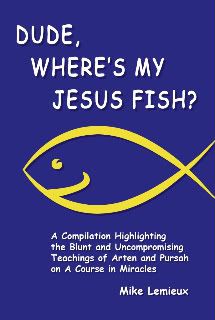Excerpt from chapter 2 of Gary Renard’s The Disappearance of the Universe - Pursah speaks as her lifetime as Jesus' disciple Thomas; Arten as Thaddaeus
Pursah: Like most people today, instead of really listening back then to what J was teaching, most of us saw and heard what we wanted to see and hear so we could use him to validate our own experience – which was the experience of being an individual in a body. Thus, we had to make him a separate and very special individual body, which is how we really saw ourselves, how you still see yourself.
Although some of us tended to be a little more intellectual, the beliefs of most of the earliest followers were simple enough. We had already seen J after the crucifixion, and since we didn’t comprehend his entire message, the inaccurate and majority opinion among the sects was that he was going to return to us again, as he had already done before, and bring in God’s Kingdom. It was expected this would happen very soon, not in the distant future and not anywhere but right on the ground. I didn’t agree with that particular scenario because, as J taught in my Gospel, the Kingdom of God is something that is present but unseen by people. In any case, there was some diversity even at the beginning, but most of the followers bought into the idea of a return. As the years wore on and the going got tough, however, the leaders of a now-developing new religion had to improvise if they were going to hold anyone’s interest.
Before you knew it, you had people relating to J as the body of all bodies. They already believed God had created a flawed world with imperfect people like Adam and Eve who were capable of making mistakes. They completely overlooked the logic that for God to create the imperfect must either mean that God Himself is imperfect or God deliberately made those who were so they could screw up, be punished by Him and suffer here on psycho planet. Then, according to Christianity, God takes – incredibly – His big-time special only begotten Son, who would apparently be more Holy than the rest of the scum of the earth, and sends him as a blood sacrifice to suffer and die on a cross as a way of vicariously atoning for people’s sins.
Except now there’s another big problem, because even according to Christianity’s own doctrines, this does not really atone for anybody else’s sins. If it atoned for people’s sins, then that would be the end of it. Problem solved. But no! It now becomes necessary for everyone to blindly believe in all of the details conveniently set forth exclusively by the Christian religion, or else they will still burn in hell, even if they happened to be born – presumably by God’s will – in a place, time, or culture that isn’t even familiar with this particular religion!
Gary: It does all sound a little bizarre when you put it that way. The whole thought system isn’t exactly complimentary to the nature of God.
Arten: That’s because it’s all symbolic of a fearful image of God rather than a loving one. We don’t mean to be disrespectful, but we have to make certain controversial statements because there’s not exactly an oversupply of people in your society who are willing to point these things out. It is true that at the time J was the most advanced spiritual person to ever appear on the earth. But everyone else, including you, will eventually attain the same level of accomplishment as him. There is no exception to this. Thus, J is not ultimately different from anyone else, and his attitude was that no one will be left out of Heaven, because there is really one of us – not all these separate bodies as you are presently dreaming.
Gary: Are you saying even murderers will end up in Heaven?
Arten: Even Saint Paul, or Saul, which was his name before he changed it so he could be a hit with the Gentiles, was a murderer before he turned in his sword. You don’t get what we’re saying. There is no Saint Paul, not really, or anyone else – including J – except in a dream. There’s nobody out there. There is only one Son of God, and you’re It. You’ll get it, but it takes years of practice to really experience it. You have to want it.
Gary: All right. You're saying that J saw people as being the same as him and God - unlimited and perfect. All other characteristics we put onto other people or onto God are really our own unconscious beliefs about ourselves?
Pursah: Yes. You have to understand that as Jews we sincerely believed that our religion had made some kind of a giant leap forward with monotheism - the idea of one God - as opposed to polytheism - the belief in many different gods. Most of us didn't know monotheism actually originated with Akhnaton in ancient Egypt, and all this idea and our continuation of it really did was take all the different personalities and characteristics, good and bad, of all these previously made up Gods and incorporate them into one God.
Gary: So now instead of all these different screwed-up gods, you had just one screwed-up God.
Arten: Well put! Of course there really is only one God and He isn't screwed up at all, and neither was the J guy, who had forgiven the world - his mind had been returned to the Holy Spirit where it belonged. That's where your mind belongs. You took it, and you have to give it back. And I've got a message for you: You'll never really be happy until you do. No matter what you imagine you have accomplished in any lifetime, thee will always be a part of you that feels like something is missing - because in your illusions something is missing.
Coming Soon! Dude, Where's My Jesus Fish?
Click here to check out the fan page on Facebook!







